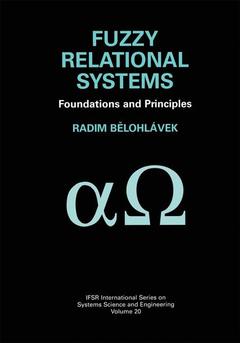Fuzzy Relational Systems, Softcover reprint of the original 1st ed. 2002 Foundations and Principles IFSR International Series in Systems Science and Systems Engineering Series, Vol. 20
Langue : Anglais
Auteur : Belohlávek Radim

Since their inception, fuzzy sets and fuzzy logic became popular. The reason is that the very idea of fuzzy sets and fuzzy logic attacks an old tradition in science, namely bivalent (black-or-white, all-or-none) judg ment and reasoning and the thus resulting approach to formation of scientific theories and models of reality. The idea of fuzzy logic, briefly speaking, is just the opposite of this tradition: instead of full truth and falsity, our judgment and reasoning also involve intermediate truth values. Application of this idea to various fields has become known under the term fuzzy approach (or graded truth approach). Both prac tice (many successful engineering applications) and theory (interesting nontrivial contributions and broad interest of mathematicians, logicians, and engineers) have proven the usefulness of fuzzy approach. One of the most successful areas of fuzzy methods is the application of fuzzy relational modeling. Fuzzy relations represent formal means for modeling of rather nontrivial phenomena (reasoning, decision, control, knowledge extraction, systems analysis and design, etc. ) in the pres ence of a particular kind of indeterminacy called vagueness. Models and methods based on fuzzy relations are often described by logical formulas (or by natural language statements that can be translated into logical formulas). Therefore, in order to approach these models and methods in an appropriate formal way, it is desirable to have a general theory of fuzzy relational systems with basic connections to (formal) language which enables us to describe relationships in these systems.
1. Preliminaries.- 1.1 Sets, relations, mappings.- 1.2 Ordered sets, lattices.- 1.3 Tolerances, equivalences.- 1.4 Algebras.- 2. Fuzzy Approach, Graded Truth, and Structures of Truth Values.- 2.1 Fuzzy approach: from resolving paradoxes to engineering applications.- 2.2 Graded truth and structures of truth values.- 2.3 Residuated lattices.- 2.4 Residuated lattices and t-norms.- 2.5 Bibliographical remarks.- 3. Fuzzy Structures.- 3.1 Fuzzy sets and fuzzy relations.- 3.2 Fuzzy logic: syntax and semantics.- 3.3 Similarity issues.- 3.4 Morphisms, products, substructures.- 3.5 Representation by crisp structures: cutlike semantics.- 3.6 Algebras with fuzzy equalities.- 3.7 Many-sorted case.- 3.8 Bibliographical remarks.- 4. Binary Fuzzy Relations.- 4.1 Operations and properties of binary fuzzy relations.- 4.2 Similarity: fuzzy equivalences.- 4.3 Hierarchy: fuzzy order.- 4.4 Bibliographical remarks.- 5. Object-Attribute Fuzzy Relations and Fuzzy Concept Lattices.- 5.1 Conceptual granulation: fuzzy context, fuzzy concepts, and fuzzy concept lattice.- 5.2 Similarity and logical precision.- 5.3 Fuzzy Galois connections.- 5.4 Main theorem of fuzzy concept lattices.- 5.5 Bibliographical remarks.- 6. Composition and Decomposition of Fuzzy Relations.- 6.1 Composition of fuzzy relations.- 6.2 Decomposition: fuzzy relational equations.- 6.3 Bibliographical remarks.- 7. Miscellanea.- 7.1 Fuzzy closure operators and similarity spaces.- 7.2 Applications of selected results to some problems and models.- 7.3 Fuzzy logic with truth degrees in residuated lattices.- 7.4 Bibliographical remarks.- References.
Presents a general theory of fuzzy relative systems with respect to models and methods Written in a mathematical style Explains the algebraic character of fuzzy relational systems using complete residual lattices Surveys several aspects of fuzzy relational modeling, structure and results Focuses on phenomena hidden in classical model theory, as well as, classical results in their generalized form Presents the subject in a logical, self-contained fashion Discusses several other important subjects on the topic of fuzzy relations and logic
Date de parution : 09-2012
Ouvrage de 369 p.
17.8x25.4 cm
Date de parution : 06-2002
Ouvrage de 382 p.
Thème de Fuzzy Relational Systems :
Mots-clés :
© 2024 LAVOISIER S.A.S.



